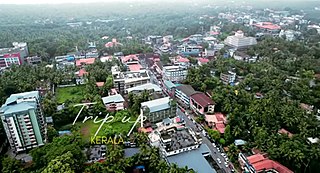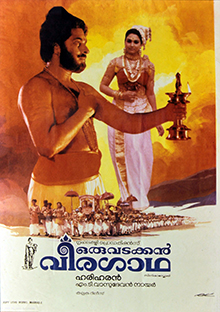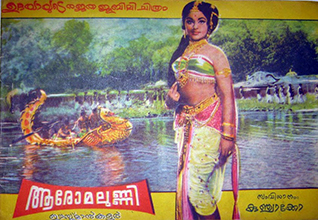Related Research Articles

Kalaripayattu is an Indian martial art that originated in Kerala, a state on the southwestern coast of India during the 11th–12th century CE.

Vatakara,, , French: Bargaret, is a Municipality, Taluk and a major town in the Kozhikode district of Kerala state, India. The municipality of Vatakara covers an area of 23.33 km2 (9.01 sq mi) and is bordered by Mahé to the north and Payyoli to the south. It is the headquarters of Vatakara taluk, which consists of 22 panchayats. During the reign of the Kolathiris and Zamorins, Vatakara was known as Kadathanadu. During the British Raj, it was part of the North Malabar region of Malabar District in the state of Madras. The historic Lokanarkavu temple, made famous by the Vadakkan Pattukal, is situated in Vatakara. A new tardigrade species collected from Vadakara coast has been named after Kerala State; Stygarctus keralensis.

Oru Vadakkan Veeragatha is a 1989 Indian Malayalam-language epic historical drama film directed by Hariharan, written by M. T. Vasudevan Nair, and starring Mammootty, Suresh Gopi, Balan K. Nair, Captain Raju and Madhavi. The film won four National Film Awards (1989) including Best Actor (Mammootty), Best Screenplay, Best Production Design and Best Costume Design and eight Kerala State Film Awards.
Chekavar were the warriors belonging to the Hindu Thiyya community in Malabar of Kerala.The character of the Chekavars, as depicted in the Vadakkan Pattukal, is as that of Lord Shiva—willing to consume the deadly Kaalakuda poison to protect the world, even at the risk of his own life. Conversely, should anyone challenge him, he will behead them without hesitation, irrespective of the enemy's identity, even if it is his own son. Many Thiyya families today trace their roots to this Chekavar lineage.

Unniyarcha (ഉണ്ണിയാർച്ച) is a legendary warrior and heroine from the 16th century, mentioned in the Vadakkan Pattukal, a set of historical ballads from northern Kerala, a state in southwestern India. She was a member of a Thiyyar community family called Puthooram Veed in Kadathanad. Her father's name was Kannappa Chekavar. She is believed to have lived in the northern part of Kerala during the 16th century. She is a popular character in Kerala's folklore and is remembered for her valour and skills in Kerala's native martial art, Kalaripayattu. According to legend, Unniyarcha was mostly known for her deadly skill with the whip-like urumi, a unique type of sword that originates from Kerala. Like most traditional Kalaripayattu practitioners, she began training at the kalari at the age of seven.
Thacholi Chandu was a warrior and a legendary hero who is believed to have lived during 17 th century in North Malabar region of Kerala, India. He belonged to the Thacholi family of Nair community. Chandu was married to Thayattu Madathu Mattu Kutti. He is praised about in Vadakkan Pattukal. He is the nephew of legendary Thacholi Othenan.

Unniyarcha ഉണ്ണിയാർച്ച is a 1961 Indian Malayalam-language action film, produced and directed by Kunchacko. The film stars Ragini, Prem Nazir, Sathyan, Thikkurissy Sukumaran Nair and Hari. Based on the life of warrior of the same name mentioned in Vadakkan Pattukal, it was released on 24 August 1961 and became a success. and this movie has a sequel named "Aromalunni". 1972 released.

Aromalunni ആരോമലുണ്ണി is a 1972 Indian Malayalam-language film directed and produced by Kunchacko, based on Vadakkan Pattukal, a collection of Northern Ballads of medieval origin. The film stars Prem Nazir, Vijayasree, Ravichandran and Sheela in the lead roles. The film has musical score by G. Devarajan and it is a sequel to the 1961 film Unniyarcha. The film was a commercial success.

Puthooramputhri Unniyarcha is a 2002 Indian Malayalam-language historical film directed by P. G. Viswambharan. Based on Vadakkanpattu, the folklore of North Malabar, which are ballads extolling the brave and valiant chekavars, it stars Vani Viswanath, Kunchacko Boban, Devan, Siddique and Captain Raju in major roles. Jagadeesh, Mala Aravindan, Jayakrishnan, Naveen Arakkal, Anoop, Sreehari, Manya, Manka Mahesh, Spadikam George and Mamukkoya form the supporting cast. This is the last film of P. G. Viswambharan.
Chandu Chekavar, was a sixteenth-century warrior of the Chekavar family from the Hindu Thiyyar caste, mentioned in the folk songs of Northern Kerala called Vadakkan Pattukal.
Aromal Chekavar, also known as Puthooram Veettil Aromal Chekavar, was a warrior who is believed to have lived during the 16th century in the North Malabar region of present-day Kerala, India. He was a warrior from a Thiyyar community and a paramount chief of the Puthooram family. His sister, Unniyarcha, was also a skilled warrior.

Veeram (transl. Valour) is a 2016 Indian historical drama film written and directed by Jayaraj. It is an adaptation of William Shakespeare's Macbeth, and is the fifth installment in Jayaraj's Navarasa series. The film, which also takes inspirations from the Vadakkan Pattukal of North Malabar region in Kerala tells the story of Chandu Chekavar, an infamous warrior in the 13th century North Malabar.
Kadhirur Gurukkal, also known as Mathiloor Gurukkal, was a martial artist of medieval India. He came from Kadirur, near to Thalasserry in the North Malabar region of present-day Kerala. He operated the Mathiloor Kalari, where Thacholi Othenan trained in Kalaripayattu.
Kadathanat Madhavi Amma was an Indian poet, novelist and short story writer of Malayalam literature. Known for poetry anthologies such as Kalyopaharam and Kanikkonna, she was also the author of two works based on Vadakkan Pattukal viz. Thacholi Othenan and Payyamvelli Chandu. The Kerala Sahitya Akademi awarded her their annual award for overall contributions in 1996.
Cherayi Panicker was the army Commander-in-chief of the zamorin dynasty. That was a status or title given by the Zamorin to selected families in the Malappuram district and the adjoining Thrissur district. Today descendants of two branches reside in present day Ponnani taluk and Chavakkad area of Malappuram district. In the past, the Panikanmars were the main soldiers of the Zamorin king. They belong to the Thiyyar caste. Cherai Kalari was very popular at that time i still exists.
Sreedharan Champad is circus artist, circus historian and Malayalam language writer from Kerala, India. He has worked in a number of fields, including working as circus manager, flying trapeze artist, circus company PRO, auto driver, bill collector, journalist and writer. Champad has written over 20 books including novels, more than 100 short stories, biographies and articles. His book An Album of Indian Big Tops chronicles the history of circus industry in India from 1880 to 2010.
Kottackkal Kanaran Gurukkal (1850–1941), was a Kalaripayattu gurukkal, who contributed to the revival or Kalarippayattu from after British rule. The Kanaran Gurukkal were born in a Chekavar Tharavad, a large Landlord near Vadakara, Kozhikode. He belongs to a Thiyya caste.
References
- ↑ Menon (2011), p. 81.
- ↑ Narayanan (2003), p. 20.
- ↑ Ayyappa Paniker, K. (1997). Medieval Indian Literature: Surveys and selections. ISBN 9788126003655.
- ↑ Nisha, P. R. (12 June 2020). Jumbos and Jumping Devils: A Social History of Indian Circus. ISBN 9780190992071.
- ↑ Sujit Mukherjee, A Dictionary of Indian Literature (Orient Longman Publications, 1998, ISBN 81-250-1453-5), page 406
- ↑ Vadakkan and Thekkan Pattukal.(Sri Rama Vilasom Press, 1967), pages 128–148
- ↑ Rakhava Warrier, Vadakkan pattukalude Paniyala 1982 Vallathol Vidhyapeedom Press